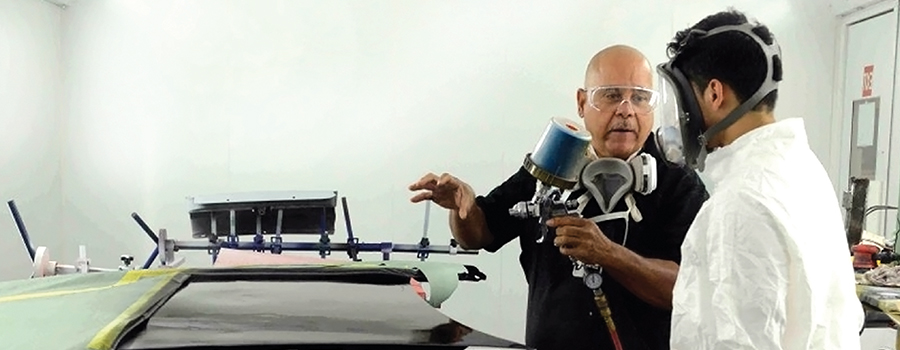
Program Objective:
The objective of the Automotive Collision Technology Technician program is to provide quality educational training designed to meet the current and future needs of the automotive collision industry. To accomplished this, the following guidelines are established: assist student to choose, prepare for, enter, and be gainfully employed in the automotive collision field; offer a program which emphasizes sound fundamentals while responding to the needs of this particular industry; provide course to meet current and specific needs of the student and this industry.
Program Outlook:
The Automotive Collision Technology Technician program provides students with the technical knowledge and skills needed for employment as collision and refinishing technicians in the auto body repair industry. Instruction includes a combination of classroom theory and practical experience. This program is certified by the National Automotive Technical Education Foundation (NATEF). Students are eligible to join SkillsUSA.
Program Content:
The content includes but is not limited to basic trade skills; refinishing skills; sheet metal repair skills; frame and unibody squaring and aligning; use of fillers; paint systems and undercoats; related welding skills; related mechanical skills; trim-hardware maintenance; glass servicing; and other miscellaneous repairs. The course content should also include training in communication, leadership, human relations and employability skills; and safe, efficient work practices.
- Metal Straightening and Aligning
- Applied Body Shell Alignment Equipment
- Body Preparation/Filling and Plastic Welding
- Techniques of Welding/Brazing
- Frame Alignment
- Shop Management
- Basic Auto Mechanics
- Refinishing Techniques
Length of Program:
The average length of this program is 1400 hours (approximately 16 months) for adults attending full- time. Actual time is dependent upon enrollment status (full-time/part-time) and the length of the time the student requires to achieve competencies. This program contains several occupational completion points designed to prepare students for various entry level jobs within this occupational area.
Admission Requirements:
- Students must be at least 16 years old and not attending high school
- Application Interview by a guidance counselor
- Fees for supplies and textbooks are required.
Entrance Dates:
This program operates on an open-entry, open-exit basis. Students may enter the program anytime during the school year. Entrance is dependent upon space availability. Call (305) 557-1100 for more information.
Graduation Requirements:
- Completion of all Occupational Completion Points (OCP’s)
- Satisfy Basic Skills Requirements
Mathematics 9 Language 9 Reading 9 - No financial obligations
- Students must complete the Clearance packet to receive program certificate.
| OCP | COURSE NUMBER | COURSE TITLE | COURSE LENGTH |
|---|---|---|---|
| A | ARR0140 | Automotive Collision Repair and Refinishing Helper/Assistant | 150 hours |
| B | ARR0141 | Automotive Collision Refinishing Technician | 450 hours |
| C | ARR0312 | Non-Structural Damage Repair Technician | 300 hours |
| D | ARR0022 | Damage Analysis and Estimating | 75 hours |
| E | ARR0112 | Automotive Collision Welding, Cutting and Joining | 75 hours |
| F | ARR0295 | Structural Damage Repair Technician | 350 hours |
Program Cost:
- In-state residents—$2.56 per hour (Subject to change)
- Out of state resident—$10.25 per hour (Subject to change)
- $20.00 application fee
- Material fee—Varies by program
- Identification Card fee—$5.00 per trimester
- Students must purchase books/kits and/or uniforms, if applicable.
Program Hours:
Monday—Friday 7:20 am—1:00 pm
Approximately Total Cost:
$4,464.00
Employment Requirements:
- Employers prefer that automotive body repair technicians complete a program at a postsecondary institution.
- Industry certification, Automotive Service Excellence (ASE) is usually required once the person is employed.
Career Opportunities:
Auto Body Repair Technician, Automotive Glass and Door Service Technician, Interior Trim and Upholstery Technician, Automotive Frame Technician, Front End Alignment Specialist, Auto Refinishing Technician, Insurance Estimator or Adjustor, Automotive Shop Foreman/Manager/Owner, Auto Salvage Distributor.
Salary:
The average wage for this career in Florida is $23.99 hourly or $49,890 annually.
Job Outlook:
Overall employment of automotive body and glass repairers is projected to grow 6% from 2020 to 2030.
Click Here To View Curriculum Framework
Helpful Resource

Program Objective:
The objective of the Commercial Vehicle Driving (Class A) program is to provide quality educational training designed to meet the current and future needs of the truck driving industry by preparing the students for a Class “A” Commercial Driver License. To accomplish this, the following guidelines are established: assist students to choose, prepare for, enter, and be gainfully employed in the trucking field; offer a program which emphasizes sound fundamentals while responding to the needs of this particular industry; provide courses to meet current and specific needs of the student and this industry.
Orientation Information:
- Orientations are held at 12:30pm and again at 4:30pm every Wednesday the school is open.
- Attendance to one in person orientation session is a program requirement for application to the course
- Please allow enough time to clear security check-in.
- Late attendees will not be permitted
Entrance Dates and Program Hours:
Classes begin approximately every 13 weeks.
Nov. 4, 2024 to Mar. 5, 2025
Monday – Friday
- Evening: 5:00 P.M. – 10:00 P.M.
Jan. 6, 2025 – Apr 16, 2025
Monday – Friday
- Morning: 7 A.M. – 12 P.M.
- Afternoon: 12 P.M. – 5 P.M.
- Evening: 5 P.M. – 10 P.M.
Mar 10, 2025 – Jun. 18, 2025
Monday – Friday
- Evening: 5:00 P.M. – 10:00 P.M
Apr 21, 2025 – Jul. 30, 2025
Monday – Friday
- Morning: 7 A.M. – 12 P.M.
- Afternoon: 12 P.M. – 5 P.M.
- Evening: 5:30 P.M. – 10:30 P.M
Please call (305) 557-1100, Ext. 2326 to obtain more information on starting dates.
Length of Program:
The average length of this program is 320 hours (approximately 13 weeks) for Class A Commercial Vehicle Driving full-time students.
Program Cost:
- In-state residents—$2.56 per hour (Subject to change)
- Out of state resident—$10.25 per hour (Subject to change)
- $20.00 application fee
- Material fee—Varies by program
- Identification Card fee—$5.00 per trimester
- Students must purchase books/kits and/or uniforms, if applicable
- Approximate Total $2,414.20
Admission Requirements:
- Application
- Interview by Guidance Counselor
- Must be 18 years old
- Must have a valid Florida Driver’s License and good driving record
- Fees for supplies and textbooks will be required
- Must pass DOT Health Examination
- Must pass DOT Drug Test
- Must obtain a State of Florida “CDL Learners Permit”
- Must obtain a certificate of completion for “Entry Level Driver Training” (ELDT)
Program Content:
The content includes but is not limited to the following: rules and regulation, introduction to equipment, defensive and preventive driving, preventative maintenance and inspection, license information for commercial drivers, loading and unloading cargo; reporting delays or accidents on the road; verifying load against shipping papers;, keeping records., testing and licensing the commercial driver and employability skills and safety.
Graduation Requirements:
- Completion of all Occupational Completion Points (OCP’s)
- No financial obligations
- Students must complete the Clearance packet to receive program certificate.
| OCP | COURSE NUMBER | COURSE TITLE | COURSE LENGTH |
|---|---|---|---|
| A | TRA0080 | Tractor Trailer Truck Driver | 320 hours |
Employment Requirements:
- Commercial truck drivers usually have a high school diploma or equivalent.
- Employers prefer that commercial truck driver complete a program at a professional truck driving school.
- They must have a commercial driver’s license (Commercial Vehicle Driving)
Career Opportunities:
Road Drivers, Local Drivers, Independent Lines Drivers, Major National Haulers, Moving Industry Drivers, Straight Truck Drivers.
Program Outlook:
The Commercial Vehicle Driving (Class A) program provides students with the technical knowledge and skills for employment as commercial vehicles drivers in the trucking industry. Instruction includes a combination of classroom theory and practical experience. This program is approved by the Florida Department of Transportation. Full-time instructors are Third Party Examiners.
Salary:
The average wage for this career in Florida is $26.12 hourly or $54,320 annually.
Job Outlook:
Employment of heavy and tractor-trailer truck drivers is projected to grow 6% from 2020 to 2030.
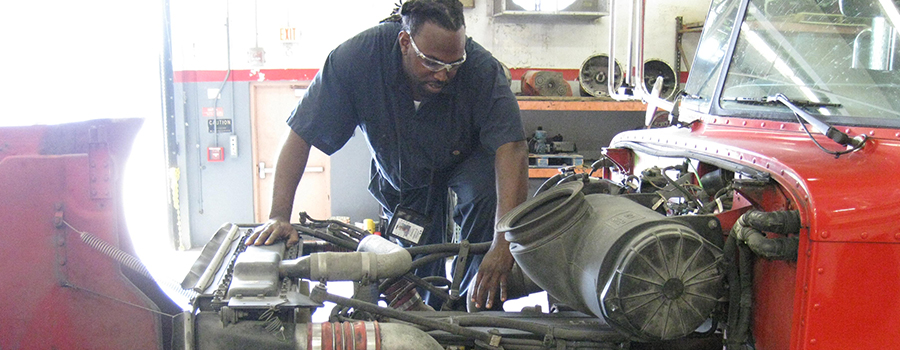
Program Objective:
The objective of the Diesel Systems Technician program is to provide quality educational training designed to meet the current and future needs of the bus, truck and diesel systems industry. To accomplish this, the following guidelines are established; assist student to choose, prepare for, enter, and be gainfully employed in the bus, truck and diesel repair field; offer a program which emphasizes sound fundamentals while responding to the needs of this particular industry; provide courses to meet current and specific needs of student and this industry.
Program Outlook:
The Diesel Systems Technician program provides students with the technical knowledge and skills for employment as Truck, Bus, and Diesel Mechanics in the Heavy Duty Truck and Bus Repair Industry. Instruction includes a combination of classroom theory and practical experience. The program also offers supplemental training for persons previously or currently employed in Heavy Duty Truck and Bus Repair occupations. This program is certified by the National Automotive Technical Education Foundation (NATEF). Students are eligible to join SkillsUSA.
Program Content:
The content includes but is not limited to maintaining and repairing diesel engines and electrical systems; reconditioning diesel fuel injection systems; overhauling diesel engines; performing diesel engine preventive maintenance, employability skills and safety practices.
Length of Program:
The average length of this program is 1800 hours (approximately 18 months) for adult attending full-time. Actual time is dependent upon enrollment status (full- time/part-time) and the length of time the student requires to achieve competencies. This program contains several occupational completion points designed to prepare students for various entry level jobs within this occupational area.
Admission Requirements:
- Students must be at least 16 years old and not attending high school
- Application Interview by a guidance counselor
- Fees for supplies and textbooks are required.
Entrance Dates:
This program operates on an open-entry, open-exit basis. Students may enter the program anytime during the school year. Entrance is dependent upon space availability. Call (305) 557-1100 for more information.
Career Opportunities:
Bus, Truck and Diesel Engine Mechanic, Diesel Mechanic Helper, Mobile Heavy Equipment Mechanics, Fleet Maintenance Technician, Industrial Truck Mechanic, Service Writer, Service Manager.
Graduation Requirements:
- Completion of all Occupational Completion Points (OCP’s)
- Satisfy Basic Skills Requirements
Mathematics 11 Language 10 Reading 10 - No financial obligations
- Students must complete the Clearance packet to receive program certificate.
| OCP | COURSE NUMBER | COURSE TITLE | COURSE LENGTH |
|---|---|---|---|
| A | DIM0101 | Diesel Engine Mechanic/Technician Helper | 150 hours |
| B | DIM0102 | Diesel Electrical and Electronics Technician | 300 hours |
| C | DIM0103 | Diesel Engine Preventive Maintenance Technician | 150 hours |
| D | DIM0104 | Diesel Engine Technician | 300 hours |
| E | DIM0105 | Diesel Brakes Technician | 300 hours |
| F | DIM0106 | Diesel Heating and Air Conditioning Technician | 150 hours |
| G | DIM0107 | Diesel Steering and Suspension Technician | 150 hours |
| H | DIM0108 | Diesel Drivetrain Technician | 150 hours |
| I | DIM0109 | Diesel Hydraulics Technician | 150 hours |
Program Cost:
- In-state residents—$2.56 per hour (Subject to change)
- Out of state resident—$10.25 per hour (Subject to change)
- $20.00 application fee
- Material fee—Varies by program
- Identification Card fee—$5.00 per trimester
- Students must purchase books/kits and/or uniforms, if applicable
Program Hours:
Monday—Friday 8:00 am—1:40 pm
Monday—Friday 5:30 pm—10:30 pm
Approximately Total Cost:
$5,857.00
Employment Requirements:
- Employers prefer that diesel service technicians and mechanics complete a program at a postsecondary institution.
- Industry certification, Automotive Service Excellence (ASE) is usually required once the person is employed.
- EPA licensure for technicians working with refrigerants.
Salary:
The average wage for this career in Florida is $24.00 hourly or $49,920 annually.
Job Outlook:
Employment of diesel service technicians and mechanics is projected to grow 8% from 2020 to 2030.
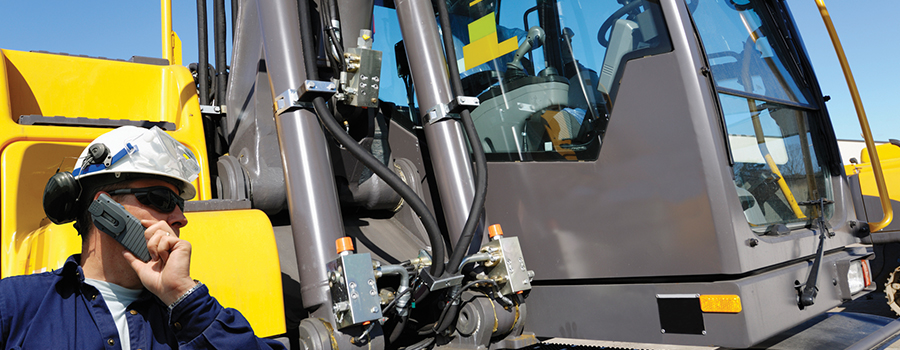
Program Objective:
The objective of the Heavy Equipment Operations Technician program is to provide quality educational training designed to meet the current and future needs of the heavy equipment operations industry. To accomplish this, the following guidelines are established: assist student to choose, prepare for, enter, and be gainfully employed in the heavy equipment field; offer a program which emphasizes sound fundamentals while responding to the needs of this particular industry; and provides courses to meet current and specific needs of the student and this industry .
Program Outlook:
The Heavy Equipment Operations Technician program provides students with the technical knowledge and skills for employment as an operator in the Heavy Equipment industry. Instruction includes a combination of classroom theory and practical experience. Students will be instructed in digging, ditching, sloping, stripping, grading, backfilling, clearing excavating, equipment maintenance and safety.
Program Content:
The content includes but is not limited to, communication skills, leadership skills, human relations and employability skills, safe and efficient work practices, and skills to operate and maintain a variety of heavy equipment. The program content also includes:
- Heavy Equipment Maintenance
- Operator Training for Bulldozer, Wheel Loader, Backhoe Loader, Motor Grader, Excavator, and Skid Steer
- Preparation for Forklift Operator Certification
- Preparation for NCCER Certifications
- 10 Hour OSHA Training Certification
- Employability Skills and Safety
Length of Program:
The Heavy Equipment Operations Technician program consists of 1200 hours. However, the school is currently offering Occupational Completion Points A (Heavy Equipment Maintenance) and B (Tractor Operator) and C (Off-road). The average length of this program is 600 hours (approximately 6 months) for full-time students.
Admission Requirements:
- Adult students must be at least 18 years old and not enrolled in high school.
- Application
- Interview by guidance counselor
- Must pass DOT Drug Test
- Fees for supplies and textbooks are required
Entrance Dates:
Classes begin approximately every 13 weeks. Please call (305) 557-1100 to obtain information on starting dates. For information call and speak to a counselor.
Graduation Requirements:
- Completion of all Occupational Completion Points (OCP’s)
- Satisfy Minimum Basic Skills Requirements
Mathematics 8 Language 8 Reading 8 - No financial obligations
- Students must complete the Clearance packet to receive program certificate.
| OCP | COURSE NUMBER | COURSE TITLE | COURSE LENGTH |
|---|---|---|---|
| A | TRA0070 | Heavy Equipment | 150 hours |
| B | TRA0086 | Tractor Operator | 150 hours |
| C | TRA0087 | Off-road Equipment | 300 hours |
Program Cost:
- In-state residents—$2.56 per hour (Subject to change)
- Out of state resident—$10.25 per hour (Subject to change)
- $20.00 application fee
- Material fee—Varies by program
- Identification Card fee—$5.00 per trimester
- Students must purchase books/kits and/or uniforms, if applicable
Program Hours:
Monday—Friday 7:20 am—1:00 pm
Approximately Total Cost:
$3,521.00
Employment Requirements:
- Heavy Equipment Operators usually have a high school diploma or equivalent.
- Employers prefer that Heavy Equipment Operators complete a program at a professional technical college.
- Some heavy equipment, such as cranes, loaders and bulldozers, require a license or certification to operate.
- Many employers require heavy equipment operators to have a commercial driver’s license (CDL) so that they can drive the truck and trailer that transport the equipment to and from the job site
Salary:
The average wage for this career in Florida is $20.44 hourly or $42,520 annually.
Job Outlook:
Overall employment of construction equipment operators is projected to grow 5% from 2020 to 2030.
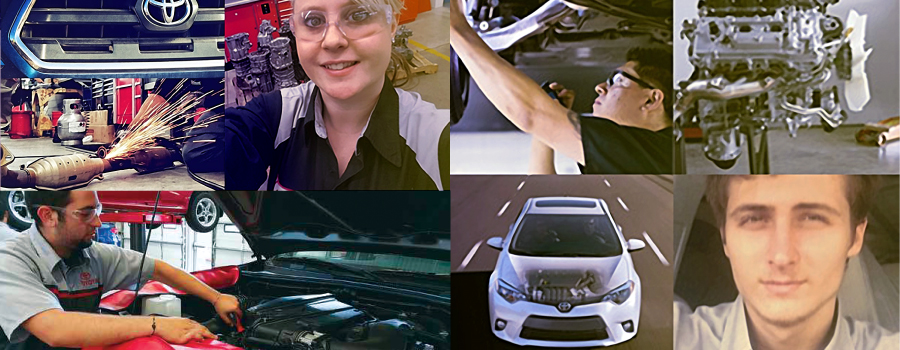

Program Objective:
The Manufacturer Specific Automotive Service Technology (MSAST) program is committed to provide educational support through the Technician Training and Education Network program in order to prepare students for professional positions of distinction in the automotive service technology repair industry. Miami Lakes Educational Center and Technical College will strive to meet and exceed the needs of our students, graduates, faculty, community, and business partners by providing innovative and competitive programs and utilizing assistance from Toyota Motor Sales, USA, Inc., and Toyota/Lexus Dealerships in the educational and employment process.
How to become a Mechanic/Automotive Technician at Toyota/Lexus
Program Outlook:
The Manufacturer Specific Automotive Service Technology program provides students with the technical knowledge and skills for employment as Toyota or Lexus Technician Specialists in the automotive industry. This program includes a combination of classroom theory anda practical experience at the school and dealerships on Toyota/Lexus automobiles. This program is certified by the National Automotive Technical Education Foundation (NATEF). Students are eligible to join the SkillsUSA.
Program Content:
The content includes but is not limited to broad, transferable skills and stresses understanding and demonstration of the following elements of the Automotive industry; planning, management, finance, technical and product skills, underlying principles of technology, labor issues, community issues and health, safety, and environmental issues.
- Electrical Systems
- Standard and Anti-Lock Brake Systems
- Air Conditioning and Heating System
- Engine Repair
- Electronic Fuel Injection
- Emission Control Systems
- Transmissions and Transaxles
- Suspension Systems
- Hybrids
- On-the-job Training
- Employability Skills/Safety
Length of Program:
The average length of this program is 2400 hours (approximately 24 months) for students attending full-time. Actual time in class is dependent upon enrollment status and the length of time the student requires to achieve competencies. This program contains nine occupational completion points designed to prepare students for various entry level jobs within this occupational area.
Admission Requirements:
- Interview with instructor.
- Presentation of a valid Driver’s License.
- Clean driving record.
- Presentation of a standard High School transcript indicating graduation or GED. (Diplomas outside of the U.S. must be evaluated.
- Social Security Card (non-U.S. citizens must produce a Resident Alien Card or a current Work Authorization card).
- Must be 18 years of age.
- Successful drug test and criminal background (required for internship placement) done at dealership.
- Students are strongly encouraged to take the TABE test and score at least an 8.0 Grade Equivalent Score.
*Students must take the TABE test or be exempt from it by the sixth week from the start of the program
Entrance Dates:
The program is offered in a two-year cohort interval. Please contact the MSAST department for specific start dates. For more information please call (305) 557-1100 to speak to a counselor.
Graduation Requirements:
- Completion of all Occupational Completion Points (OCP’s)
- Satisfy Basic Skills Requirements
Mathematics 10 Language 10 Reading 10 - No financial obligations
- Students must complete the Clearance packet to receive program certificate.
- To be an MSAST Graduate, the student must earn two (2) ASE’s.
Program Cost:
- In-state residents—$2.56 per hour (Subject to change)
- Out of state resident—$10.25 per hour (Subject to change)
- $20.00 application fee
- Material fee—Varies by program
- Identification Card fee—$5.00 per trimester
- Students must purchase books/kits and/or uniforms, if applicable
| OCP | COURSE NUMBER | COURSE TITLE | COURSE LENGTH |
|---|---|---|---|
| A | AER0011 | Automotive Maintenance Technician | 400 hours |
| B | AER0118 | Advanced Engine Repair Technician | 200 hours |
| C | AER0258 | Advanced Automatic Transmission and Transaxle Technician | 200 hours |
| D | AER0275 | Advanced Manual Drivetrain and Axle Technician | 200 hours |
| E | AER0459 | Advanced Automotive Suspension and Steering Technician | 200 hours |
| F | AER0419 | Advanced Automotive Brake System Technician | 200 hours |
| G | AER0319 | Advanced Automotive Electrical/Electronic System Technician | 400 hours |
| H | AER0173 | Advanced Automotive Heating and Air Conditioning Technician | 200 hours |
| I | AER0506 | Advanced Automotive Engine Performance Technician | 400 hours |
Program Hours:
Monday—Friday 7:15 am—12:15 pm
Approximately Total Cost:
$8,146.00
Employment Requirements:
- Employers prefer that automotive service technicians and mechanics complete a program at a postsecondary institution.
- Industry certification, Automotive Service Excellence (ASE) is usually required once the person is employed.
- EPA licensure for technicians working with refrigerants.
Career Opportunities:
Toyota/Lexus Dealership Technician, Automotive Technician, Service Writer, Service Manager
Salary:
MSAST technicians typically start at about $75,000 a year. In some markets, Toyota or Lexus technicians who attain Master status can earn $80,000+ a year, and some even earn more than $100,000 annually. Many MSAST graduates have the potential to earn great money, receive solid benefits, and have a great future — doing what they love.
Job Outlook:
Employment of automotive service technicians and mechanics is projected to have little or no change 0% from 2020 to 2030.
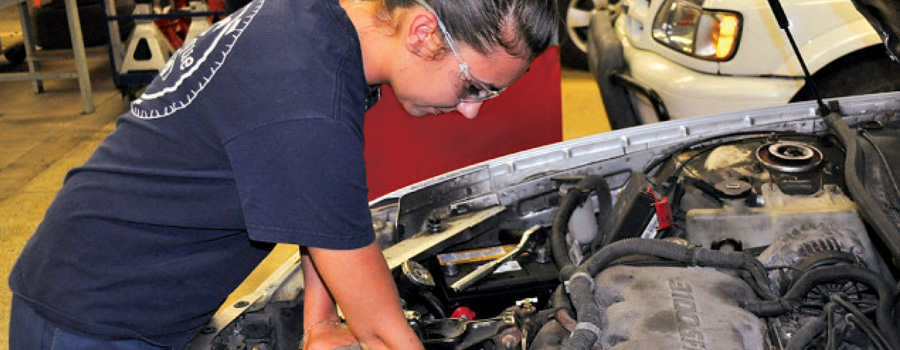
Program Objective:
The objective of the Automotive Service Technology program is to provide quality educational training designed to meet the current and future needs of the automotive service industry. To accomplish this, the following guidelines are established: assist students to choose, prepare for, enter, and be gainfully employed in the automotive field; offer a program which emphasizes sound fundamentals while responding to the needs of this particular industry; provide courses to meet current and specific needs of the student and this industry.
Program Outlook:
The Automotive Service Technology program provides students with the technical knowledge and skills for employment as automotive technicians in the automotive industry. Instruction includes a combination of classroom theory and practical experience. This program is certified by the National Automotive Technical Education Foundation (NATEF). Students are eligible to join SkillsUSA.
Program Content:
The content includes but is not limited to broad, transferable skills and stresses understanding and demonstration of the following elements of the Automotive industry: planning, management, finance, technical and product skills, underlying principles of technology, labor issues, community issues and health, safety, and environmental issues. In addition, students will also work on Service Tools and Bench Skills, Brakes/Alignment, Cooling Systems, Air Conditioning and Heating, Electrical and Electronic Systems, Fuel, Exhaust and Emission Systems, Power Flow Systems, Engine Repair and Performance, Automatic Transmission/Transaxle and Employability Skills and Safety.
Length of Program:
The average length of this program is 1800 hours (approximately 1 year and 8 months) for adults attending full-time. Actual time is dependent upon enrollment status (full-time/part-time) and the length of time the student requires to achieve competencies. This program contains several occupational completion points designed to prepare students for various entry level jobs within this occupational area.
Admission Requirements:
Students must be at least 16 years old and not attending high schoolApplication Interview by a guidance counselor Fees for supplies and textbooks are required.
Entrance Dates:
This program operates on an open-entry, open-exit basis. Students may enter the program anytime during the school year. Entrance is dependent upon space availability. Call (305) 557-1100 for more information.
Career Opportunities:
- Automotive Lube Technician
- Automotive Brake System Technician
- Automotive Suspension and Steering Technician
- Automotive Electrical/Electronic System Technician
- Automotive Engine Performance Technician
- Engine Repair Technician
- Automotive Service Assistor
- Automotive Heating and Air Conditioning Technician
- Manual Drive Train and Axles Technician
- Automatic Transmission and Trans-Axle Technician
- Service Writer
- Service Manager
Graduation Requirements:
- Completion of all Occupational Completion Points (OCP’s)
- Satisfy Basic Skills Requirements
Mathematics 10 Language 9 Reading 9 - No financial obligations
- Students must complete the Clearance packet to receive program certificate.
Program Cost:
- In-state residents—$2.56 per hour (Subject to change)
- Out of state resident—$10.25 per hour (Subject to change)
- $20.00 application fee
- Material fee—Varies by program
- Identification Card fee—$5.00 per trimester
- Students must purchase books/kits and/or uniforms, if applicable
| OCP | COURSE NUMBER | COURSE TITLE | COURSE LENGTH |
|---|---|---|---|
| A | AER0014 | Automobile Services Assistor | 300 hours |
| B | AER0110 | Engine Repair Technician | 150 hours |
| C | AER0257 | Automatic Transmission and Transaxle Technician | 150 hours |
| D | AER0274 | Manual Drivetrain and Axle Technician | 150 hours |
| E | AER0453 | Automobile Suspension and Steering Technician | 150 hours |
| F | AER0418 | Automotive Brake System Technician | 150 hours |
| G | AER0360 | Automotive Electrical/Electronic System Technician | 300 hours |
| H | AER0172 | Automotive Heating and Air Conditioning Technician | 150 hours |
| I | AER0503 | Automotive Engine Performance Technician | 300 hours |
Program Hours:
8:00 am—1:40 pm and 5:30 pm—11:00 pm
Approximately Total Cost:
$6,747.00
Employment Requirements:
- Employers prefer that automotive service technicians and mechanics complete a program at a postsecondary institution.
- Industry certification, Automotive Service Excellence (ASE) is usually required once the person is employed.
- EPA licensure for technicians working with refrigerants.
Career Opportunities:
Toyota/Lexus Dealership Technician, Automotive Technician, Service Writer, Service Manager
Salary:
The average wage for this career in Florida is $21.09 hourly or $43,860 annually.
Job Outlook:
Employment of automotive service technicians and mechanics is projected to have little or no change 0% from 2020 to 2030.
